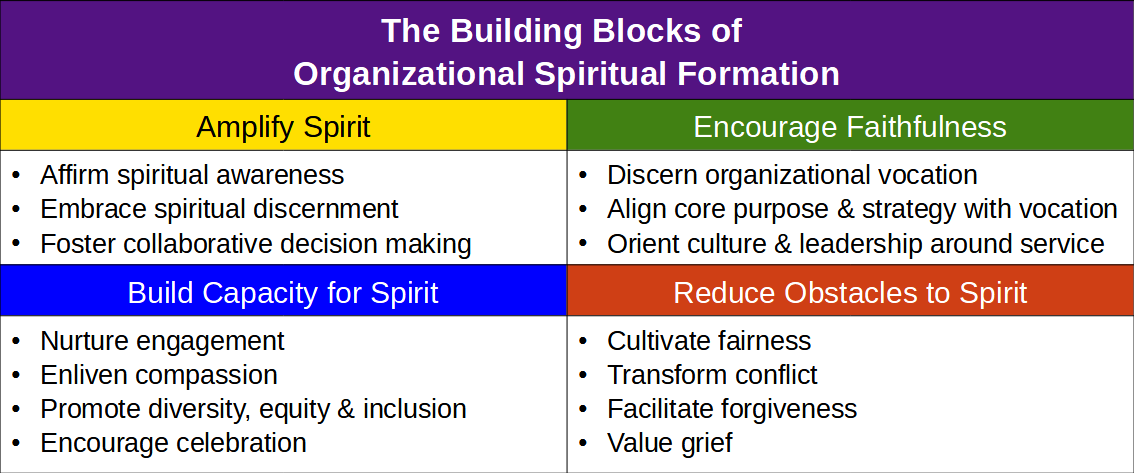Workplace Spirituality
Workplace spirituality is the recognition that employees have an inner life that nourishes and is nourished by meaningful, purposeful work that takes place in a context of community and connectedness.¹
By engaging in spiritual direction and organizational spiritual formation practices, leaders and organizational members support workplace spirituality and come to more fully exemplify right relationship with God, each other, those they serve, and creation.
Organizational Spiritual Formation Framework
Our faith-based model of organizational spiritual formation is composed of four avenues:
- Amplify Spirit – promote awareness, openness, and responsiveness to the presence and guidance of the Holy Spirit
- Encourage Faithfulness – contribute to the realization of God’s purposes by discerning and aligning with the organization’s vocation
- Build Capacity for Spirit -cultivate working relationships that testify to God’s love by promoting positive relationships with work and among co-workers
- Reduce Obstacles to Spirit – cultivate working relationships that testify to God’s love by reducing the frequency of difficult or harmful experiences in the workplace and promoting recovery from them
The Building Blocks of Organizational Spiritual Formation
Leaders contribute to workplace spirituality when they integrate these building blocks into their organization:

Overview and Process
While there is no single path, frequently the first step leaders take toward enhancing workplace spirituality is when they engage in spiritual direction. Some leaders pursue spiritual direction due to a personal desire for greater spiritual depth. Other leaders realize that by deepening their spiritual life and aligning their actions more fully with their faith they contribute to a culture that supports others’ spiritual development and faith.
Leaders take the next step toward enhancing workplace spirituality when they determine that their leadership team is open to faith sharing or spiritual conversation. When leaders understand each others’ faith journey and support each others’ spiritual growth, the depth of collaboration that develops can pave the way for greater innovation and impact.
It is out of this context that conversations about organizational spiritual formation unfold most profitably. When leaders have experience with their own transformation, they are better able to model workplace spirituality and support organizational spiritual formation.
The organizational spiritual formation process begins when a leader or leadership team chooses to integrate the elements that make up the Amplify Spirit and Encourage Faithfulness building blocks into their organization.
The process continues when a leader or leadership team models and champion the elements associated with Build Capacity for Spirit and Reduce Obstacles to Spirit building blocks and works in collaboration with team members and support functions to ensure they become established in the culture.
When the scope of a project moves beyond the leadership team, the process consists of the following steps:
- An initial conversation to determine fit and define the project
- Additional discovery to determine the scope of the work and readiness to proceed
- Agreement acceptance and definition of reporting and working relationships
- Information gathering and/or discernment through assessments and inquiry-based discovery
- Data analysis, data interpretation and reporting with recommendations or designing for innovation
- Action planning and implementation or delivering on designs for innovation
- Project evaluation
In addition to the traditional project steps, we also offer post-project follow-up. It will be requested about six months after the conclusion of the project.
While benefits are specific to each organization, research shows that workplace spirituality creates positive outcomes for individuals and organizations.¹ ² ³
Individual Benefits
- Greater capacity for coping, reduced stress and aggression
- Buffering for emotional labor
- Improved intuition and creativity
- Higher levels of altruism, empathy, and compassion
- Greater job and life satisfaction
- Higher levels of engagement and productivity
Workplace Benefits
- Higher levels of employee
well-being and decreased burnout - Greater engagement, productivity, and commitment
- More organizational citizenship behaviors
- Higher levels of work unit and organizational performance
- Stronger ethical decision making

We partner with leaders and leadership teams who seek to create a transformative workplace culture that fosters well-being, increases retention, and promotes service excellence.
We welcome opportunities to work with faith-based, faith-rooted, and spirituality-friendly non-profit organizations and for-profit businesses. We will partner with you to develop the best approach for you and your organization.


